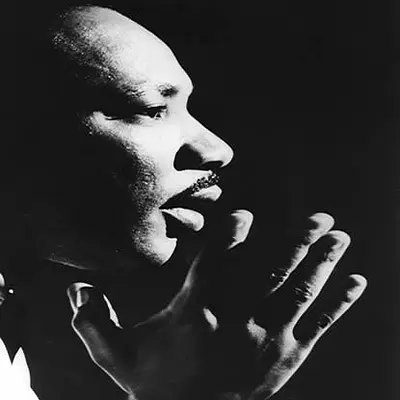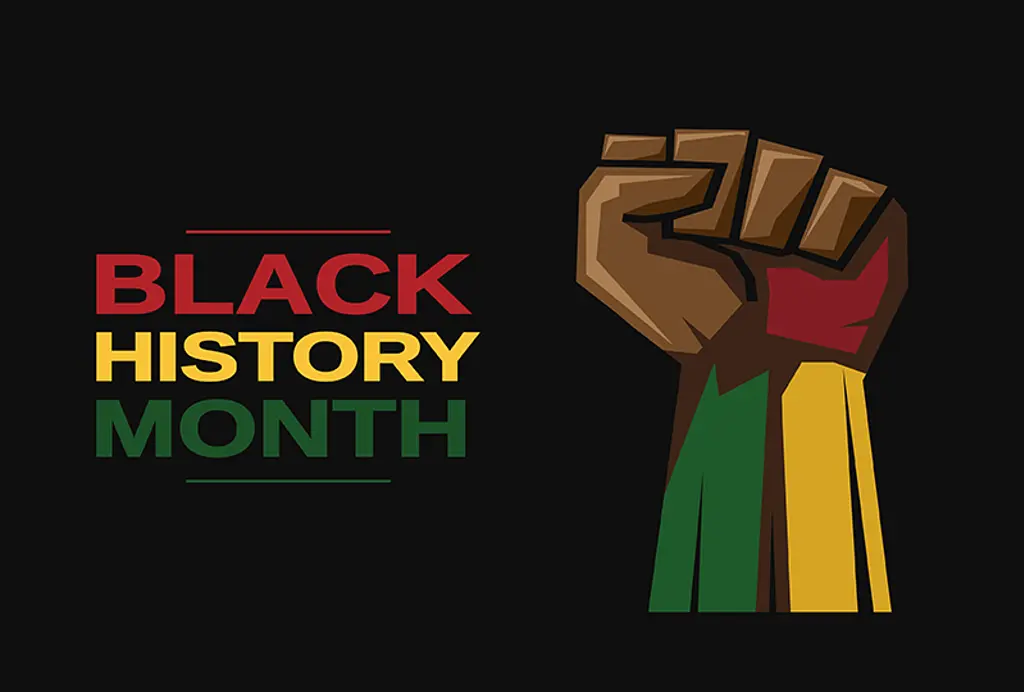This piece was written by Cara Valentino (Senior Manager of the Racial Justice and Equity Program), Ariana Katz (Public Health Analyst), and Da'Vianna Nelson (Corporate Communications Specialist), and shared with RTI staff. The opinions expressed in this piece are their own.
Black History Month exists to honor the “triumphs and struggles of African Americans throughout U.S. history.” This Black History Month we want to do something different. We want to honor Black leaders of the past but with both eyes open, examining how and which parts of their triumphs and struggles we remember.
Last month, we celebrated the birthday of Reverend Dr. Martin Luther King, Jr., a name known the world over. An iconic figure, Dr. King represents for many the core of the civil rights movement of the 1960s. Yet, what do people really know about him and his activism? Many may not know much beyond his call for non-violence and community service, the version of Dr. King most often taught in classrooms and depicted in MLK Day articles over the past four decades. Articles about Dr. King often include a short quote of his meant to inspire people to participate in a day of community service.
But this is 2022, and our understanding of systemic racism and its impacts on all of us have evolved. We know more, so more is required of us to truly establish the change Dr. King hoped to see in the world.
We have an opportunity to use our experiences and what we now know to look more deeply. The word respect, after all, means “looking back” or “looking again.”
Let’s take some time to open our eyes to the legacy of Dr. King. Jane Allen, RTI International’s Senior Manager of Public Health in the Center for Health Analytics, Media, and Policy and facilitator of the institute’s Black Employee Resource Group’s Ally Workshop, discussed what we misremember and forget about Dr. King in a speech* given during a citywide celebration of his life in Melrose, Massachusetts in 2019. To summarize a few key excerpts:
We misremember Dr. King when we recall his peaceful approach to change, but forget his urgency; forget that he said, “we can never be satisfied” as long as Black people are “the victim of the unspeakable horrors of police brutality.”

“I get so tired of people turning Dr. King into a dreamer. They made him safe. He was a revolutionary.” - Prof. Doreen Loury, Arcadia University
The United Way offers that “racial equity is achieved when race no longer factors into or determines one’s socioeconomic outcomes....” In examining society today, segregation may be illegal but it is still prevalent in practice in most communities across America, due to redlining. Wide socioeconomic disparities continue as demonstrated by the racial pay gap and health inequities that continue to plague Black people disproportionately. In September of 2020, a study conducted by St. Louis University declared racism a public health crisis, and six months later, in April 2021, the CDC declared the same. By these measures, one imagines Dr. King would not be satisfied.
While Dr. King is misremembered, other seminal civil rights activists of the 1960s are largely ignored, forgotten or even villainized.
We don’t talk about Ella Baker, Diane Nash, or Fannie Lou Hammer as household names, despite being influential leaders of the Student Non-Violent Coordinating Committee. We don’t have a day celebrating Huey P. Newton, Bobby Seale and The Black Panther Party for Self-Defense, whose original goal was to end police brutality in Oakland, Calif., and who created the free school breakfast program that millions of American children still benefit from today. We don’t collectively honor Malcolm X (el-Hajj Malik el-Shabazz), who celebrated and uplifted the beauty of Black people, and fought for equal rights as well. He had a deep understanding of racial inequity, about which Dr. King said: “While we did not always see eye to eye on methods to solve the race problem, I always had a deep affection for Malcolm and felt that he had the great ability to put his finger on the existence and root of the problem.” (King, 26 February 1965).
To move forward we must understand and accept the fuller history, not just the idyllic version of Dr. King’s famed “I have a dream” speech, which is the lead story of the past. At the time of his death, for example, Dr. King was “one of the most reviled men in the United States,” but that’s not what we often hear about him. The retelling of U.S. history is generally rooted in “white supremacy culture” – a concept many are starting to understand more about. Racial and social justice scholar, Tema Okun, describes white supremacy culture as, “the widespread ideology baked into the beliefs, values, norms, and standards of our groups (many if not most of them), our communities, our towns, our states, our nation, teaching us both overtly and covertly that whiteness holds value, whiteness is value.”
White supremacy culture strives to ensure that someone like Dr. King is remembered only in small, easily digestible pieces designed to not make anyone (specifically white people) uncomfortable. White supremacy culture is one of the reasons why the general population doesn’t learn more about civil rights activists who participated in racial justice methods less palatable to fearful white audiences. It is why we don’t see the fuller history, which divulges uncomfortable truths about the targeting of Black activists fighting for Black liberation and the fear white people had of Black people retaliating against them with violence akin to that experienced by Black people in the U.S. for centuries.
The way the U.S. has treated Black people since its inception is, to say the least, uncomfortable. Thus, the fight for civil rights was then, and is now, uncomfortable. It requires pushing against the status quo, as Dr. King also spoke about in his Letter from Birmingham Jail, and which activists around the U.S. today who have been maimed by rubber bullets and police batons – some have even lost their lives – can attest, is also uncomfortable.
Recognition of Dr. King’s birthday as a Federal holiday in the U.S. was the result of decades of pushing by activists. While we look back to honor and remember Black leaders of the past, we also want to highlight and uplift the voices of Black leaders of the present while they are here doing the work. Because Black leaders of today are tomorrow’s Black history.
Ignorance of each other is what has made unity impossible. Therefore, we need enlightenment. We need more light about each other. Light creates understanding, understanding creates love, love creates patience, and patience creates unity. Once we have more knowledge about each other, we will stop condemning each other and a united front will be brought about.” – Malcolm X
Think about some of today’s civil rights activists like Rev. Dr. William Barber, Dr. Nikole Hannah-Jones, Dr. Khalil Gibran Muhammad, Melanie Campbell, Ava Duverney, Bernice King, James Rucker, Bryan Stevenson or W. Kamau Bell.
Do you get uncomfortable reading their words, watching their shows or movies or listening to their speeches? Do you find yourself disagreeing with their tactics? Do you find yourself questioning their validity or wishing they said something in a different manner or with a different tone? Or do you hear them for what they’re doing? Fighting for racial equity, just as their civil rights predecessors did, so that we all might reclaim our collective humanity? How would you treat them 50 years from now? How much effort is being expended to understand their work?
As we enter Black History Month this February, we also enter an opportunity to embody the advocate and activist Dr. King truly was and go beyond the January community service projects. What modern civil rights activists and causes can we learn about, uplift and support?
At RTI, we are committed to a mission that requires us to dig deep, to look at societal problems and use our expertise to find solutions. Doing so is not always comfortable. And sometimes we must push against the status quo to ensure that we are appropriately addressing inequity and injustice in our communities and world. Over the past two years, we have risen to the call to work to create an equitable and just society, one that is a reflection not only of Dr. King’s message, but the message of many Black civil rights leaders and individuals. RTI’s new Transformative Research Unit for Equity (TRUE) is one example of how we are responding.
This legacy is not about Martin, Arndrea, and Yolanda. This legacy and what Martin Luther King fought and stood for really is about all of us,” she said. “And it really is up to us to continue in our own unique way that legacy but also to protect and restore all of the gains that were made. And also, in a very real sense, to do our part to continue to be the flames of what’s just and equitable.” – Waters King
We want to honor Black leaders of today as the changemakers they are instead of waiting until they leave this earth to recognize their influence. And we want to think of the Black leaders of the future, who will continue to push the boundaries of society as we know it and, if history is any indication, likely make the world a better place for all.
Educational resources+ to learn more about modern civil rights issues:
*Based on Misremembering Dr.King, by Dr. Jennifer Yanco
+As a tax-exempt nonprofit organization, RTI is prohibited from engaging in political campaign activities.



